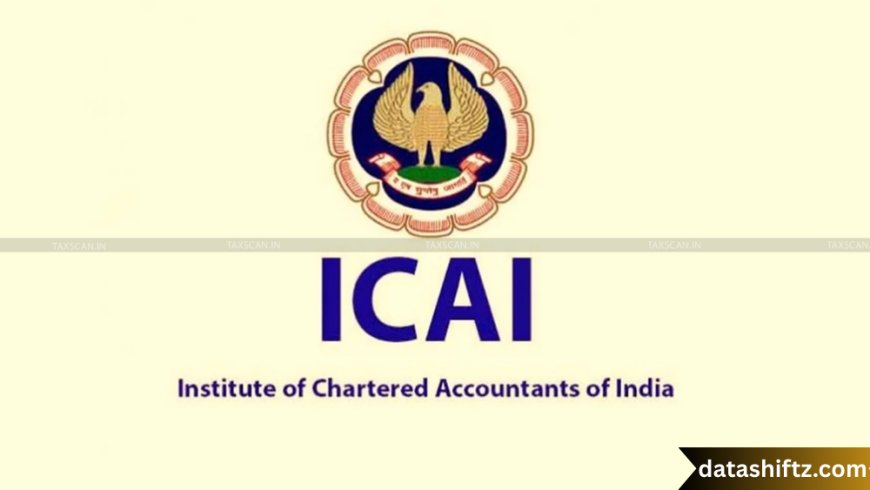ICAI: Shaping India’s Financial Integrity and Accountancy Excellence

Introduction
Established in 1949 under the Chartered Accountants Act, the Institute of Chartered Accountants of India (ICAI) is a statutory, non-profit body tasked with regulating the profession of chartered accountancy in India. As of 2024–25, it's the second-largest accounting body in the world, with over 400,000 members and a robust ecosystem of students and professionals.
ICAI plays a pivotal role in formulating accounting standards, conducting one of the most rigorous professional examinations, and ensuring ethical compliance among practitioners. Its influence spans financial regulation, auditing practices, standard-setting, education, and policy advisories—all of which shape India’s financial architecture.
The Structure and Governance of ICAI
Foundational Framework
ICAI was established under the Chartered Accountants Act, 1949, enacted by the Indian Parliament. It functions under the Ministry of Corporate Affairs and operates with full legal authority to certify professionals and regulate the accountancy profession in India.
Governance Structure
-
Council of ICAI: Comprising 32 elected members and 8 nominees from government bodies (like SEBI, MCA, CAG).
-
Leadership Roles: The President acts as the chief executive of the Council, supported by a Vice President and a Secretary.
-
Regional Network: ICAI has five regional councils (Western, Eastern, Southern, Northern, Central) and over 163 domestic branches, along with 31 overseas chapters and a virtual presence through ICAI’s digital infrastructure
Core Functions and Contributions
Regulating the Profession
-
ICAI sets the eligibility criteria, such as Foundation, Intermediate, and Final examinations, followed by articleship training, to certify Associate (ACA) and Fellow (FCA) members.
-
Only members with a valid Certificate of Practice (CoP) can conduct statutory and tax audits in India.
Standardizing Financial Practices
-
Through its Accounting Standards Board (ASB), established in 1977, ICAI formulates and updates accounting standards aligned with IFRS.
-
It issues Auditing, Assurance, and Quality Control Standards, as well as Forensic Accounting & Investigation Standards for complex financial scrutiny.
Education, Training, and Development
-
ICAI administers one of the toughest professional examinations in India and offers continuous education via CPE programs, workshops, national seminars, e-learning modules, and refresher courses.
-
It also collaborates with IGNOU for integrated Bachelor's and Master's degrees aligned with the CA curriculum.
Ethical Oversight and Disciplinary Action
-
ICAI enforces a Code of Ethics and conducts disciplinary proceedings through dedicated bodies like the Board of Discipline and Disciplinary Committee.
-
High-profile disciplinary actions—for example, related to the Satyam audit scandal—highlight its rigorous oversight.
Advisory and Global Engagement
-
ICAI advises the government on taxation, corporate governance, and financial policy.
-
It actively contributes to international forums such as IFAC, SAFA, CAPA and holds Mutual Recognition Arrangements (MRAs) with global accounting bodies including ICAEW, CPA Australia, and CPA Canada.
Adoption of Technology and Innovation
-
ICAI has launched ICAI TV, a 24x7 online channel for disseminating knowledge, live events, and stakeholder engagement.
-
To keep pace with future challenges, ICAI is integrating Artificial Intelligence (AI) into its curriculum starting 2027 and has already conducted over 500 AI training sessions for CAs.
Impact, Recognition, and Future Direction
Celebrating ICAI’s Legacy
-
CA Day, held annually on July 1, commemorates ICAI’s founding in 1949 and celebrates the role of CAs in upholding financial transparency. In 2025, ICAI marked its 77th anniversary.
Contribution to Economic Development
-
At the 38th Auditors’ Conference, ICAI’s leadership emphasized chartered accountants' role in ensuring tax compliance and public financial accountability, while embracing digital and AI tools in education and practice.
Summary of ICAI’s Key Aspects
| Aspect | Highlights |
|---|---|
| Establishment | Chartered Accountants Act, 1949 |
| Membership | Over 400,000 CAs (ACA and FCA) |
| Examination Structure | Foundation → Intermediate → Articleship → Final |
| Standard-Setting Bodies | ASB, Auditing & Quality Control, Forensic Accounting Standards |
| Disciplinary Mechanism | Board of Discipline, Disciplinary Committee |
| Education & CPE | CPE programs, e-learning, IGNOU partnership, AI integration |
| Global Engagement | IFAC, SAFA, MRAs with ICAEW, CPA Australia, CPA Canada, etc. |
| Technology Initiatives | ICAI TV, virtual campus, digital portals, AI curriculum |
| Celebration & Legacy | CA Day (1st July), 77th anniversary celebrated in 2025 |
Why ICAI Matters in India’s Financial Ecosystem
-
Safeguards Financial Integrity—By setting accounting and auditing standards that ensure transparent corporate reporting.
-
Regulates the Profession—Through stringent examinations, ethical codes, and disciplinary action.
-
Drives Professional Excellence—By offering continuous education and adapting to emerging trends like AI.
-
Supports National Governance—Serving as an advisor to government and regulators on fiscal policies.
-
Promotes Global Recognition—Through international partnerships and harmonization with IFRS.
-
Embraces Technological Innovation—Using digital platforms like ICAI TV and virtual systems.
-
Fosters Inclusivity and Outreach—With global chapters and recognizable frameworks accessible across India.
Conclusion
For over seven decades, ICAI has been not just a regulator but a torchbearer of professional excellence in India’s accounting landscape. Its robust examination system, ethical oversight, standard-setting authority, and adaptive approach to technology have grounded the credibility of the chartered accountant profession.
As the financial environment evolves—with digital transformation and AI becoming central—ICAI stands at the forefront, aligning education, ethics, and innovation to safeguard the future of financial integrity in India.






























